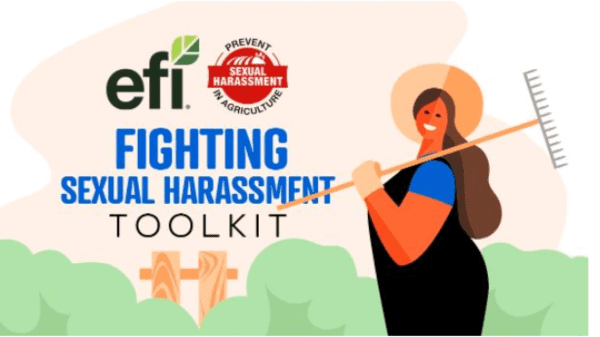Free Training Tools Available to Address Sexual Harassment of Farmworkers
WASHINGTON – Equitable Food Initiative, the workforce development and certification organization that partners with growers, farmworkers, retailers and consumer advocacy groups, has collaborated with Pacific Northwest Agricultural Safety and Health Center (PNASH), a part of the University of Washington Department of Environmental and Occupational Health Sciences, to support the development of a worksite training and toolkit, ¡Basta! Preventing Sexual Harassment in Agriculture.
April is National Sexual Harassment Awareness and Prevention Month, and EFI is using the time to shine a light on this important topic. Several studies have found that 75%-80% of female farmworkers have experienced sexual harassment at work, compared to 50% in non-agricultural office settings as reported by the Equal Employment Opportunity Commission.
The EFI website offers statistics, facts and study citations on harassment at work, links to access the ¡Basta! Preventing Sexual Harassment toolkit, which features videos in both English and Spanish, and educational materials that can be used in workplaces (posters, shareable graphics and a detailed fact sheet). The information and resources can be found at equitablefood.org/harassment, and all are provided free of charge.
“Development of the ¡Basta! toolkit was catalyzed by female farmworkers in Eastern Washington who brought the issue of sexual harassment to PNASH,” explained Dr. Jody Early, a professor at University of Washington who worked on the project. “This is the first program created by and for agricultural stakeholders to address the prevention of sexual harassment, and we tailored it to the needs of Latino/a/x farmworkers, growers and supervisors.”
The PNASH team worked for six years and engaged more than 48 different stakeholders in the development – including farmworkers, grower associations, health care advocates, human rights organizations, state and federal agencies, farmworker rights groups, private businesses and nonprofits like Equitable Food Initiative.
“This can be a difficult topic, but it’s essential that we address it industrywide,” said LeAnne Ruzzamenti, director of marketing communications for EFI. “We know that harassment happens more frequently among farmworkers, we know that it goes unreported, and we know that agriculture workplaces include characteristics that make women more vulnerable to it.”
EFI’s certification program goes beyond a simple audit and introduces workforce development solutions along with training in communication, conflict resolution, problem-solving and collaboration. Third-party evaluation studies have found that the program fosters culture shifts on farms that result in respectful and trusting workplaces where women and indigenous workers report reduced harassment and discrimination.
“EFI’s mission is to improve the lives of farmworkers by bringing everyone in the system together to address the fresh produce industry’s most pressing problems,” Ruzzamenti continued. “I can’t think of a more important goal than creating safer and healthier workplaces through a zero-tolerance approach to harassment.”

About EFI
Equitable Food Initiative is a nonprofit certification and skill-building organization that seeks to increase transparency in the food supply chain and improve the lives of farmworkers through a team-based approach to training and continuous improvement practices. EFI brings together growers, farmworkers, retailers and consumers to solve the most pressing issues facing the fresh produce industry. Its unparalleled approach sets standards for labor practices, food safety and pest management while engaging workers at all levels on the farm to produce Responsibly Grown, Farmworker Assured fruits and vegetables. For more information about Equitable Food Initiative, visit equitablefood.org.
View a list of EFI-certified farms at equitablefood.org/farms.



